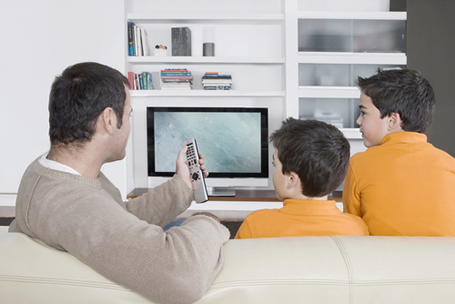Television and Childhood
Any analysis of television cannot be separated from the social context in which its use is inserted. Furthermore, we must keep in mind the preference of children for television as a result of countless advances and setbacks in human history.
It is precisely the adequacy of the language used by television and by other communication mechanisms, culture and entertainment that makes it such an effective tool in informing children around the world. This means that television is gaining strength because its forms and display content are very similar to those of other media: everyone speaks the same language and says the same things.
Over the years, television has become a central socialization device for many children, gaining a space previously occupied, for example, by religion, school and family. This is because, among other reasons, television uses techniques to inform that other institutions cannot use. Among these mechanisms, we can highlight the use of images, which simplifies content, being more inviting than other ways of trying to explain the world.
How does television manage to attract children's attention?
As we said, among other mechanisms, there is the coherence between the television language and that of other means of communication, in addition to the use of the image and simplifications of reality.
In addition to these mechanisms, we can highlight the characteristic of approximation that television understands in relation to reality. As an instrument that unites sound and image, it seems to exhibit reality and, through this mechanism, becomes closer to the interests of children than other socializing institutions. Another relevant factor is that, unlike cinema, television “goes” to children's homes, it's there. Therefore, it does not depend on major detachments, efforts or commitments.
Why has television become the main form of entertainment for children?
Changes in the family configuration, the departure of parents for increasingly long and exhausting work journeys, the difficulty in providing diverse cultural activities and, often, the lack of resources to propose other forms of entertainment for the children end up making television the fastest way to socialize. required. This means that, for reasons like these, television becomes a kind of very low-cost babysitter, since is in the homes and does not require major commitments in the parents' routine, which amplify the socializing task of the television.
What are the problems in the child-television relationship?
There are many developments in the studies on the relationship between children and television. As a result of many researches, it was discovered that the Brazilian child, for example, is the one that most watches television around the world, spending more than three and a half hours a day in front of the set. Among the consequences of this prolonged exposure are social learning (which could also occur through observation of parents' behavior and other real people), desensitization (in the face, for example, of scenes of violence, which can become increasingly acceptable by children), the increase in fear (caused by representations of the world as a terrifying place) and the stifling of the difficulty in understanding the contradictions. As the child is introduced to a single view of the phenomena, he can stop questioning himself about the reality around him, becoming vulnerable to untrue explanations.
Do not stop now... There's more after the advertising ;)
How can the relationship between children and television be improved?

It is very important that parents accompany their children when they are in front of the small screen
First, reduce the amount of time children spend on television so that they are “forced” to find new forms of entertainment. In addition, it is important to monitor parents and guardians when children are watching television, to try to problematize the stereotypes and “truths” presented on the screen, questioning them about their application real. In this sense, parents can question children about the correspondence, or not, between what they observe on television and outside of it. Television can be used as a motivator for several discussions that, if well used, bring the family closer together. Questioning children about the characters and actions of television and about real life, off screen, can be a way of make the relationship with the device different, without it being a hindrance to the imagination, questioning and curiosity of the small.
How to find out more?
the documentary "Child, the soul of the business", produced by Estela Renner and available online, is an important tool to understand the dimensions of the relationship between children and television, especially the dimension of advertising. In addition, the book “the unimaginative boy”, by Carlos Eduardo Novaes, manages to show the drama of the imaginative paralysis of children submitted to socialization via television. This book is an important vehicle for knowledge because it can be read by parents, teachers and children themselves.
Juliana Spinelli Ferrari
Brazil School Collaborator
Graduated in Psychology from UNESP - Universidade Estadual Paulista
Brief psychotherapy course by FUNDEB - Foundation for the Development of Bauru
Master's Student in School Psychology and Human Development at USP - University of São Paulo
